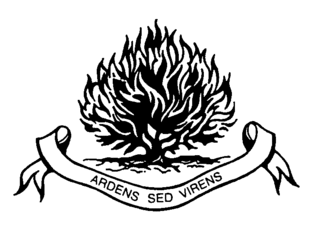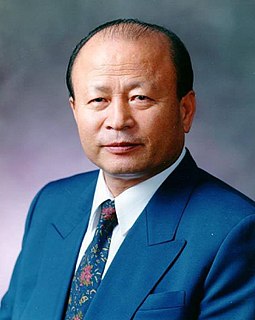
Calvinism is a major branch of Protestantism that follows the theological tradition and forms of Christian practice set down by John Calvin and other Reformation-era theologians. It emphasises the sovereignty of God and the authority of the Bible.

Presbyterianism is a part of the Reformed tradition within Protestantism that traces its origin to the Church of Scotland. Presbyterian churches derive their name from the presbyterian form of church government by representative assemblies of elders. Many Reformed churches are organised this way, but the word Presbyterian, when capitalized, is often applied to churches that trace their roots to the Church of Scotland or to English Dissenter groups that formed during the English Civil War.

South Chungcheong Province, also known as Chungnam, is a province of South Korea. South Chungcheong has a population of 2,059,871 (2014) and has a geographic area of 8,204 km2 located in the Hoseo region in the southwest of the Korean Peninsula. South Chungcheong borders the provinces of Gyeonggi to the north, North Chungcheong, Sejong Special Autonomous City, and Daejeon Metropolitan City to the east, and North Jeolla to the south.

The practice of Christianity in Korea is marginal in North Korea, but significant in South Korea, where it revolves around two of its largest branches, Protestantism and Catholicism, accounting for 8.6 million and 5.8 million members, respectively. Catholicism was first introduced during the late Joseon Dynasty period by Confucian scholars who encountered it in China. In 1603, Yi Gwang-jeong, a Korean diplomat, returned from Beijing carrying several theological books written by Matteo Ricci, an Italian Jesuit missionary to China. He began disseminating the information in the books, and the first seeds of Christianity were sown. In 1758, King Yeongjo of Joseon officially outlawed Catholicism as an "evil practice." Catholicism was reintroduced in 1785 by Yi Seung-hun and since then French and Chinese Catholic priests were invited by the Korean Christians.

The Family Federation for World Peace and Unification, widely known as the Unification Church, is a new religious movement whose members are called Unificationists, or more widely known as "Moonies". It was officially founded on 1 May 1954 under the name Holy Spirit Association for the Unification of World Christianity (HSA-UWC) in Seoul, South Korea, by Rev. Dr. Sun Myung Moon (1920–2012).
The Korea Baptist Convention is a Baptist Christian denomination in South Korea. It is affiliated with the Baptist World Alliance. The headquarters is in Seoul.

Throughout the ages, there have been various popular religious traditions practiced on the Korean peninsula. The oldest indigenous religion of Korea is the Korean folk religion, which has been passed down from prehistory to the present. Buddhism was introduced to Korea from China during the Three Kingdoms era in the 4th century, and the religion pervaded the culture until the Joseon Dynasty, when Confucianism was established as the state philosophy. During the Late Joseon Dynasty, in the 19th century, Christianity began to gain a foothold in Korea. While both Christianity and Buddhism would play important roles in the resistance to the Japanese occupation of Korea in the first half of the 20th century, only about 4% of Koreans were members of a religious organization in 1940.
There are no known official statistics of religions in North Korea. Officially, North Korea is an atheist state, although its constitution guarantees free exercise of religion, provided that religious practice does not introduce foreign forces, harm the state, or harm the existing social order. Based on estimates from the late 1990s and the 2000s, North Korea is mostly irreligious, with the main religions being Shamanism and Chondoism. There are small communities of Buddhists and Christians. Chondoism is represented in politics by the Party of the Young Friends of the Heavenly Way, and is regarded by the government as Korea's "national religion" because of its identity as a minjung (popular) and "revolutionary anti-imperialist" movement.

The Church of Jesus Christ of Latter-day Saints was unofficially established in South Korea as early as World War II due to religious influence by LDS servicemen; however, Korean people did not begin to get baptized until the missionary efforts of LDS servicemen during the Korean War. Kim Ho Jik was the first Korean person to be baptized in the LDS Church on July 29, 1951 in New York. Two of his children were of the first four Korean people baptized in Korea on August 3, 1952. LDS Church presence and missionary work was officially established on April 20, 1956 with the arrival of two missionaries: Don G. Powell and Richard L. Detton. The Korean Mission opened on July 8, 1962 with Gail E. Carr as the first president of the mission. Successful missionary work led to the growth of the LDS Church in the 1960s and 1970s leading to the organization of the first stake in Korea in 1973 and the dedication of the first temple in Seoul on December 14, 1985.

Ahn Sahng-hong was a South Korean Christian minister and founder of the Church of God Jesus Witnesses. In 1948, after receiving the baptism of the Seventh-day Adventist priest, he began to call for the restoration of the truth of the New Testament and the last religious reformation. In 1964, he officially established the Church of God Jesus Witnesses in Busan. Ahn Sahng-hong believed that Catholic and Protestant Sundays, Christmas, Thanksgiving, and wearing the cross should not be observed because they are not biblical doctrines, and he advocated the observance of Sabbath and the seven festivals including and Passover, Pentecost and Sukkot.

The World Mission Society Church of God is a new religious movement that is influenced by the Church of God (Seventh-Day) and originated in South Korea in 1964. After Ahn Sahng-hong died in 1985, Kim Joo-cheol and Zahng Gil-jah changed the church's name to Witnesses of Ahn Sahng-hong Church of God. Thereafter, the Church expanded its activities to other parts of the world, and began using the name World Mission Society Church of God. Its headquarters as well as its main church are located in the southeast of the Seoul metropolitan area.
Freedom of religion in South Korea is provided for in the South Korean constitution. The South Korean government has generally respected this right in practice, although it provides no exemption or alternative civilian service for those who have a religious objection to serve in the armed forces.
Dr. Kang Won Yong was a Christian leader, pioneer of the ecumenical movement in Korea, and an advocate for peace and reconciliation in the Korean peninsula.

Religion in South Korea is diverse. A substantial number of South Koreans have no religion. Christianity and Buddhism are the dominant confessions among those who affiliate with a formal religion. Buddhism and Confucianism play an influential role in the lives of many South Korean people. Buddhism, which arrived in Korea in 372 AD, has tens of thousands of temples built across the country.

Articles related to Christianity include:

Reconciliation theology or the theology of reconciliation raises crucial theological questions about how reconciliation can be brought into regions of political conflict. The term differs from the conventional theological understanding of reconciliation, but likewise emphasises themes of justice, truth, forgiveness and repentance.

The Victory Altar is a Christian new religious movement founded in South Korea in 1981. It teaches that Jesus Christ was a false messiah and that the real Christ is its founder, Cho Hee-Seung (1931–2004), “the Victor Christ.” The movement had some 400,000 members in the early 1990s. By 2017, however, membership declined to around 100,000. The decline came after Cho's arrest 1994 and death in 2004.